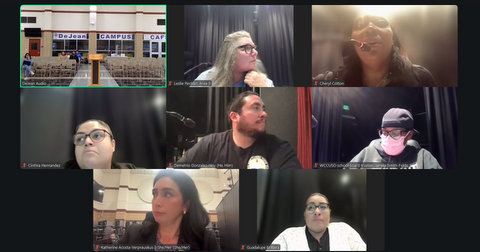
12 Aug WCCUSD Approves Charter School Expansion but Wants Diversity, Transparency Improvements

(Screenshot captured by Samantha Kennedy / The CC Pulse)
By Samantha Kennedy
Despite a potential loss in revenue for the district’s youngest learners and concerns about transparency and diversity, the West Contra Costa school board gave the OK last week for a local charter school to expand.
The Voices College-Bound Language Academy at West Contra Costa County will add another site to accommodate a projected increase in its enrollment for kindergarteners and preschoolers.
The approval, which was recommended by district staff despite the potential for reduced funding for kindergarten and transitional kindergarten enrollment, follows a May 27 request from Voices to add a new campus in Richmond and a July 16 public hearing.
The current Voices’ site in Richmond at 201 28th St. in Richmond serves 343 students, according to 2024-25 school year enrollment data from the California Department of Education. The new site at 2354 Andrade Ave. would accommodate 180 students without any improvements.
Enrollment has grown at Voices for the last seven years and the expansion is a “natural evolution” of the charter school, according to the school.
Diversity, transparency continue to challenge charters
In line with recent decisions on charter school operations, some board members warned Voices’ leadership that they would later revoke their support if they didn’t increase the diversity of its student population.
Latino students made up 97.9% of Voices’ enrollment during the 2023-24 school year, with only one African American student and three Asian students, according to the California Department of Education.
The school later enrolled two more Black students in the 2024-25 school year.
By comparison, WCCUSD’s student population is also mostly Latino or Hispanic, accounting for 58.5% of enrollment in the 2023-24 school year.
“I’m trying to separate tonight from the issues I’m seeing with the site,” said board member Demetrio Gonzalez-Hoy. “I know that saying this now, when your petition is coming in in seven, eight months is going to be hard, but I think that you have done an amazing job of talking to the community. If you guys can expand that to other communities, that’d be great.”
While the Aug. 6 vote wasn’t a decision on whether the charter school would be allowed to operate after its charter expires — that decision is set to be made next year — officials have cited diversity concerns when making those decisions.
Board member Jamela Smith-Folds pointed to the lack of diversity, particularly in Black students, when explaining her vote to close Richmond Charter Academy in April. Smith-Folds said the academy having only 12 Black students was “unacceptable.”
Smith-Folds was also the lone vote against renewing the charter of Leadership Public Schools Richmond because of its lack of diversity.
Smith-Folds and Gonzalez-Hoy said that the lack of diversity in other student subgroups, namely those who are immigrants, unhoused or in foster care, was also a problem for Voices.
“I don’t like some of the numbers — not just Black students, but homeless youth, foster youth, immigrant students,” said Gonzalez-Hoy.
Voices said it had seen a small increase in some racial demographics since the 2023-24 school year.
Gonzalez-Hoy also noted transparency concerns with Voices’ operations, pointing to what he believed were “potentially Brown Act violations” related to the school’s public meetings.
Gonzalez-Hoy said the school did not post its meeting agendas online and did not post meeting recordings.
“I really question those pieces, which makes me then question more and dig more,” said Gonzalez-Hoy.
Board President Leslie Reckler and Gonzalez-Hoy also questioned the school’s enrollment projections, with Reckler saying their projections were “not accurate.”
“This is not how enrollment works. It just isn’t,” said Reckler. “I don’t know what your regular cohort retention rate is. I went back through your data and it’s not awesome.”
To project future enrollment — which in part determines funding — Voices said it “rolled over [its] enrollment from year to year.”
When pressed by Reckler on how they addressed what she called “cohort stability,” where a number of students would start in kindergarten and half would no longer be enrolled by middle school, Voices reiterated that it still rolled over current enrollment numbers.
“What we’ve been experiencing the past few years is actually a little bit of growth from one year to the next in each of the grade levels,” said Aldo Ramirez, CEO of Voices. “So, conservatively speaking, what we did was a rollover of the equivalent of the previous year.”
Historically speaking, Reckler said, that wasn’t true.
In the 2019-2020 school year, the 57 students who started in first grade at Voices were reduced to a remaining 39 students in the 2024-25 school year.
“So, it seems to me that you’re not retaining the students who enter, is that correct?” Reckler asked Voices leaders at the meeting, noting the otherwise “slight increase” in cohort retention in more recent years.
Voices said that while the enrollment dip was true several years ago due to COVID and post-COVID, that had shifted to an increase since then.






No Comments